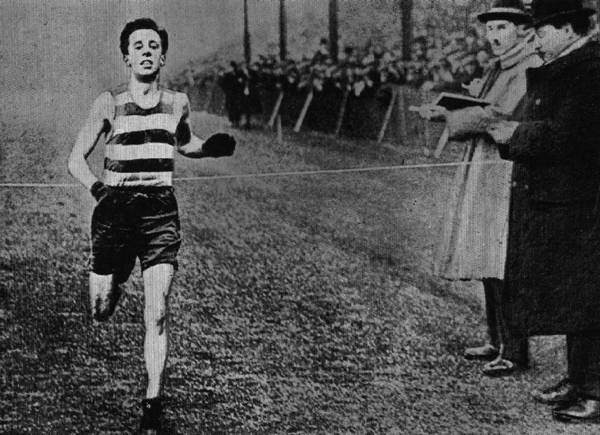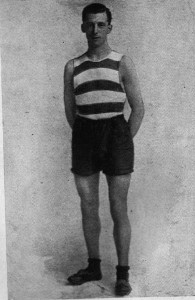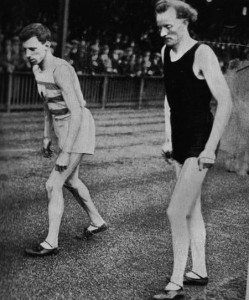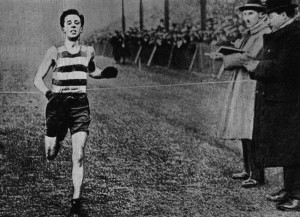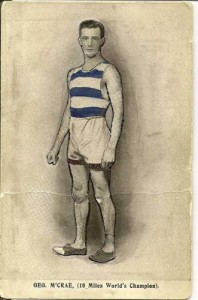George McCrae
Alastair Douglas (Victoria Park) was one of the best Scottish runners of his generation and he got in touch about one of his relatives who was a professional runner in the early 20th century. His name as a ped was George McCrae. Many, if not all professional runners used false names right up to fairly recent times: not as glamorous as in the 18th or 19th centuries when they used false names and had nicknames such as the Gateshead Clipper or Crowcatcher. Read on until the final paragraph where some information from Alex Wilson, a real student of the period, in included. Alastair continues with the story:
“George McCrae was a postman from Banknock who was one of the best distance runners of his time – he was running at the time of the First World War and the 1920’s and he held the title of World Professional 10 Mile champion. His real name was Gavin Sorbie and he was born in 1893. During the war he was working in the mines, which explained the fact that he was not overseas on war duty. He was a professional long distance runner, although a lot of the best distance runners were amateur. He used to compete in front of huge crowds although the crowd was sometimes there for a football match. People would place bets on the outcome of races between these ‘pedestrians’. He was the first Scottish winner of the Powderhall Marathon and was champion 6 times. Powderhall was a famous professional athletics meeting in Edinburgh and the ‘Marathon’ was actually a 10 or 15 mile track race. He also competed in many handicap events (usually from scratch) and in several head-to-head encounters, often over 10 miles, against other British or European long distance running stars.
Lining up against RE Cole of England at the start of a 10 miles championship at Powderhall Grounds on August 2nd, 1924. McCrae won in 52:39 to retain his title of “World Professional 10 Mile Champion”.
1918 was his best year in athletics. That year at Powderhall he broke the world professional 10 mile record (also breaking the 8 mile record during the same race.) The report on the race states that he would probably have broken the amateur record also if the financial inducements had been worthwhile! It was common practice in those days to take a competition name. Although most of the top runners of the day were amateur it sounds as if he was probably still one of the best distance runners in Britain, amateur or professional, at that time. His times are still respectable today. He ran his last race when he was about 30 and was forced to retire after an injury that I am sure he would have been treated for nowadays. Indeed he could have gone on in his 30’s to better his times. When he retired from athletics he became a football trainer with Heart of Midlothian FC and eventually died in 1971.”
Alastair also provided this link to a video clip which showed a brief glimpse of him winning the Powderhall Marathon in 1923 where he led from gun to tape beating Willie Kolehmainan of Finland (no relation to the 1912 Olympic champion) and Hans Holmer of the USA. His time was 1:20:30. www.britishpathe.com/video/powderhall-marathon/query/Edinburgh
George McCrae winning at Powderhall in 1915
There is a lot to interest us here including the reference to the fact that in 1918, after he set new world professional record, he could have broken the amateur record had the reward been high enough. ‘Peds’ went for the victory every time, after the money of course, the contest was the thing rather than the time hence the fact that in reports of many races no time was given. Reading about the amateur WG George racing the professional William Cummings from Paisley and other professional matches, once the opposition was broken, there was no need to push on too hard.. Alastair also mentions races where the principal attraction on the day was a football match. When I came in to the sport there were many athletics sports meetings at football grounds and they almost invariably included five a side football matches. In the very late 20th century, Frank Horwill of the BMC was claiming a first for having races held at half-time in big football matches.
Powderhall was a purely professional meeting and was the highlight of the year for most Scottish peds. All the best men turned out there and to win the championship there was a real mark of a man’s talent – George won six times! I well remember in the 1960’s many wanting a race between the Powderhall Champion Ricky Dunbar and the SAAA champion WM Campbell but it was not to be – amateurs could not race against pedestrians! In addition professionals used to on a ‘prep’ before the meeting. This often meant the runner going to stay with his coach or trainer for several weeks of concentrated preparation for the race: no food was consumed without the trainer having a spoonful first to ensure that it was cooked properly; it was bed at the same time every night (often as early as 9:00 pm); training two or three times a day and daily massage. It was said that a man after such a ‘prep’ had a glow about him when he removed his sweats or tracksuit; that he walked differently and had an air of confidence about him. There’s no evidence that McCrae did it but it is an indication of how seriously this meeting was taken.
Although this is a website dedicated to the amateur endurance athletes of Scotland, we have already a page dedicated to Paddy Cannon who was also a professional although slightly before McCrae’s time and it is felt that George McCrae is a worthy addition.. Finally, Alastair has been a VPAAC runner all his days, and although George was running before Victoria Park were, have a look at this picture
Alex Wilson from Fife, currently employed in Germany, who is writing a book about this period has this to say about George. “The Sorbies were a famous family of distance runners from Draffan and today Gavin, or George McCrae, is the best known of them. I believe that a Sorbie won the famous Red Hose Race in the mid 1800’s but I can’t say for sure. He was coached by his Dad who himself had apparently been quite a useful runner in his day. There are a couple of pictures of him in ‘Powderhall & Pedestrianism’ . He won the Powderhall Marathon for the first time in 1914 the distance then being 15 miles. The Evening News finally gave him a trophy to keep in 1919. His 10 mile world record of 50:55, set at Powderhall in 1918 was pretty amazing given the circumstances. He was lucky to have been in an essential occupation or he would have been running from bullets. He had a great race with John Lindsay in 1923, winning just yards from the finish. By 1926 the writing was on the wall and he was eclipsed among others by Allan Scally who never got anywhere near his times but who is better known today.” He went on to say, “Historically I’d put him down as the successor to William Cummings and Paddy Cannon and the last of the truly great Scottish professional distance runners. He had a very light frame and ran with a pitter-patter stride, a little reminiscent of Jm Dingwall. You can see that on the Pathe News film that Alastair recommended. He moved to Edinburgh and took up a coaching post with Hearts. Within a year of him taking up the reins, Hearts did the double against the Rangers in the League which back then was an amazing achievement. After George/Gavin quit running, his Dad emigrated to Canada and took up a coaching post there. After the War he ran a confectioner’s and tobacconist’s shop in Tynecastle with his son John.”
